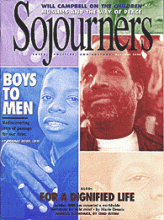The children at the day care center where I once worked in the Bogota shantytowns drew pictures of the green farms where they used to live, where there was room to play and one could drink the water from the rivers. But in the barrios there is only one playground, next to a ditch full of sewage and runoff from a nearby factory. Why did these children's families move from the countryside to these makeshift shantytowns?
Colombia, under structural adjustment programs proscribed by the International Monetary Fund (IMF), needed increased exports to service its debt burden. It sought international corporations to buy huge tracts of land to export cash crops such as coffee. Small farmers were forced off their lands and came looking for work in the cities.
Debt affects real lives all over the world, yet often it is hard for us to understand how. The Social Justice Committee of Montreal's interactive CD-ROM, Pillaged Lives: Third World Debt and Global Institutions, is an excellent tool to help groups and individuals with little or no background in international economic issues make these connections.
The main presentation walks you through the debt story in a way that is easy to understand, yet does justice to its complexity. The narrator identifies the shared history of almost all Third World countries in colonialism. You are guided through the birth of the IMF and the World Bank, the influence of the formation of OPEC on lenders, Mexico's default in 1982, and thus the onset of what we call the "debt crisis."
The CD-ROM medium, although slow at loading between sections, is especially effective as an educational tool because it carries the viewer through the program like a video, but pauses at the end of each section to allow the viewer to click on a variety of text documents or "slide shows" to gain more in-depth information. A person can go through the entire presentation in two or three hours.
Read the Full Article
